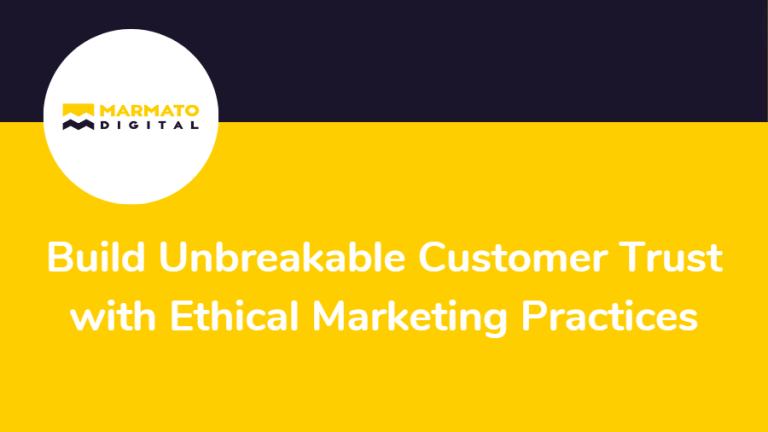Trust is the cornerstone of any strong relationship, and this is especially true between customers and brands. Customers who trust a brand are likelier to remain loyal, make repeat purchases, and recommend the brand to others. Transparent and ethical marketing practices are key to building this trust. Let’s dive deep and explore how embracing transparency and ethics in your marketing practices can help you build and maintain customer trust.

Understanding Transparent and Ethical Marketing:
What is transparent marketing?
Transparent marketing means being open and honest about your products, services, and business practices. This includes clearly communicating what your product does, how it’s made, and how it’s priced. The goal is to ensure that customers have all the information they need to make informed decisions.
What constitutes ethical marketing?
Ethical marketing involves promoting products and services fairly, truthfully, and respectfully to customers. This means avoiding deceptive marketing practices, respecting customer privacy, and ensuring that all advertising is honest and not misleading. Ethical marketing also includes being socially responsible and considering the broader impact of your business on society and the environment.
Benefits of Transparent and Ethical Marketing Practices:
• Building Customer Trust:
A trust-based relationship with customers leads to long-term benefits. Customers who trust a brand are likelier to stick around, buy more products, and become loyal supporters. They are also less likely to switch to competitors, even if those competitors offer lower prices or flashy promotions.
• Enhancing Brand Loyalty:
When a brand consistently demonstrates ethical practices, such as honesty in advertising, respect for customer privacy, and responsibility, customers feel good about supporting that brand. This sense of loyalty means they are more likely to return for future purchases.
• Positive Word-of-Mouth and Referrals:
When customers trust and feel loyal to a brand, they share their positive experiences with others. This can happen through word-of-mouth, social media, or online reviews. Happy customers often become brand advocates, spreading the word about the brand’s positive attributes and encouraging others to try it.
Ethical Marketing Practices:
1. Respecting Customer Privacy:
- Importance of data protection and privacy:
Protecting customer data and respecting their privacy is crucial. Customers need to feel confident that their personal information is safe and not being misused. This means being responsible when handling data and being open about how you collect, use, and store it.
- Complying with GDPR and CCPA regulations:
Following privacy laws and regulations, such as the General Data Protection Regulation (GDPR) in Europe and the California Consumer Privacy Act (CCPA) in the United States, is essential. These regulations protect customer data and give individuals more control over their personal information. Following these laws not only helps avoid legal problems but also helps gain the trust of customers.
2. Fair and Inclusive Advertising:
- Avoiding discriminatory or offensive content:
Ethical marketing involves creating advertisements that are fair and respectful. This means avoiding content that could be seen as discriminatory or offensive to any group of people. Ads should be inclusive and considerate of different cultures, genders, ages, and backgrounds.
- Promoting diversity and inclusion in marketing:
Promoting diversity and inclusion in your marketing efforts can help reach a broader audience and show that your brand values all customers. This involves showcasing diverse groups of people in your advertisements and making sure your marketing messages are inclusive and respectful.
3. Sustainable and Responsible Marketing:
- Emphasizing eco-friendly and socially responsible practices:
Customers are more worried about the environment and social issues. Ethical marketing includes highlighting your brand’s eco-friendly and socially responsible efforts. This could involve using sustainable materials, reducing waste, and supporting social causes.
- Transparency in supply chain and production processes:
Being transparent about your supply chain and production processes builds trust and shows that your brand is committed to ethical practices. This means being open about where your products come from, how they are made, and the conditions in which workers are employed. Sharing this information with customers helps them make informed choices and feel good about supporting your brand.
Ethical Marketing Common Challenges and How to Overcome Them:
1. Overcoming Skepticism:
- Building credibility gradually:
Customers might be initially skeptical, especially if they have encountered dishonest brands. To overcome this, start by making small, consistent efforts to be transparent and ethical. Over time, these efforts will build up and help establish your brand’s credibility.
- Demonstrating consistent ethical behavior:
Consistency is key. Always act ethically in every aspect of your business, from marketing to customer service to product development. When customers see that your brand consistently behaves ethically, they will trust you more.
2. Balancing Transparency with Competitive Advantage:
It’s important to be transparent, but you also need to protect your competitive edge. Share information that builds trust and informs customers, such as how your products are made or your company values, without giving away critical business secrets. Find the right balance by being open about your practices while keeping strategic information confidential.
3. Navigating Ethical Dilemmas:
- Handling difficult decisions and maintaining integrity:
Sometimes, you’ll face tough decisions where the right choice isn’t always clear. When these situations arise, prioritize integrity. Think about the ethical impact of your decisions and aim to do what’s best for your customers and your brand.
- Learning from mistakes and making amends:
No brand is perfect, and mistakes can happen. It’s important to own up to them quickly and transparently when they do. Apologize to your customers, explain what went wrong, and outline the steps you’re taking to fix the issue. Making amends shows that your brand is accountable and committed to maintaining ethical standards.
Key Takeaways:
- Trust is Essential: Trust is the foundation of strong customer relationships and brand loyalty.
- Be Transparent: Share honest information about your products, services, and business practices.
- Act Ethically: Promote your brand fairly, truthfully, and respectfully.
- Protect Customer Privacy: Handle customer data responsibly and comply with privacy laws.
- Promote Inclusivity: Ensure your marketing is inclusive and respectful of all audiences.
- Show Responsibility: Highlight your brand’s eco-friendly and socially responsible practices.
- Be Consistent: Consistently demonstrate ethical behavior in all aspects of your business.
- Balance Information: Share enough to be transparent without revealing business secrets.
- Address Mistakes: Own up to errors, apologize, and explain how you’ll fix them.
- Long-Term Benefits: Building trust leads to loyal customers, repeat business and positive word-of-mouth.
Ready to build unbreakable customer trust and elevate your brand’s reputation?
Embracing transparency and ethics in your marketing practices can help you build and maintain customer trust. Marmato Digital is dedicated to helping you create honest, inclusive, and responsible marketing strategies that resonate with your audience and foster long-term loyalty. Contact us today to learn how we can support your journey toward building a trustworthy and ethical brand!
Subscribe to Newsletter
Get our latest blogs directly to your inbox.

